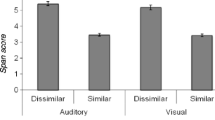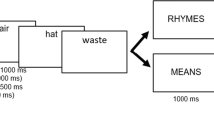Abstract
A relationship between phonological short-term memory tasks (e.g., nonword repetition, digit span) and vocabulary learning in both experimental and real-life conditions has been reported in numerous studies. A mechanism that would explain this correlation is, however, not known. The present study explores the possibility that it is the quality of phonological representations that affects both short-term recall and long-term learning of novel wordlike items. In Experiment 1, groups with relatively good and poor span for pseudowords were established. The good group was found to perform better at explicit memory tasks tapping the incidental learning of a limited stimulus pool used in an auditory immediate serial pseudoword recall task. In Experiment 2, the results of Experiment 1 were replicated when experience of correct recall was controlled. In Experiment 3, the immediate recall performance of the good group was found to benefit more than that of the poor group from syllable repetition within stimulus pools. It is concluded that the efficiency of a process that creates phonological representations is related both to short-term capacity for verbal items, and to long-term phonological learning of the structure of novel phonological items.
Similar content being viewed by others
References
Atkins, P. W. B., &Baddeley, A. D. (1998). Working memory and distributed vocabulary learning.Applied Psycholinguistics,19, 537–552.
Avons, S. E., Wragg, C. A., Cupples, L., &Lovegrove, W. J. (1998). Measures of phonological short-term memory and their relationship to vocabulary development.Applied Psycholinguistics,19, 583–601.
Baddeley, A. D. (1986).Working memory. Oxford: Oxford University Press, Clarendon Press.
Baddeley, A. D. (2003). Working memory: Looking back and looking forward.Nature Reviews Neuroscience,4, 629–639.
Baddeley, A. D., Gathercole, S., &Papagno, C. (1998). The phonological loop as a language learning device.Psychological Review,105, 158–173.
Baddeley, A. D., &Hitch, G. (1974). Working memory. In G. H. Bower (Ed.),The psychology of learning and motivation. (Vol. 8). New York: Academic Press.
Baddeley, A. D., Papagno, C., &Vallar, G. (1988). When long-term learning depends on short-term storage.Journal of Memory & Language,27, 586–595.
Baddeley, A. D., Thomson, N., &Buchanan, M. (1975). Word length and the structure of short-term memory.Journal of Verbal Learning & Verbal Behavior,14, 575–589.
Belleville, S., Caza, N., &Peretz, I. (2003). A neuropsychological argument for a processing view of memory.Journal of Memory & Language,48, 686–703.
Bishop, D. V. M., North, T., &Donlan, C. (1996). Nonword repetition as a behavioural marker for inherited language impairment: Evidence from a twin study.Journal of Child Psychology & Psychiatry,37, 391–403.
Ceponiene, R., Service, E., Kurjenluoma, S., Cheour, M., &Näätänen, R. (1999). Children’s performance in pseudoword repetition depends on auditory trace quality.Developmental Psychology,35, 709–720.
Cheung, H. (1996). Nonword span as a unique predictor of secondlanguage vocabulary learning.Developmental Psychology,32, 867–873.
Cowan, N. (1999). The differential maturation of two processing rates related to digit span.Journal of Experimental Child Psychology,72, 193–209.
Cowan, N., Keller, T., Hulme, C., Roodenrys, S., McDougall, S., &Rack, J. (1994). Verbal memory span in children: Speech timing clues to the mechanisms underlying age and word length effects.Journal of Memory & Language,33, 234–250.
Dufva, M., &Voeten, M. J. M. (1999). Native language literacy and phonological memory are prerequisites for learning English as a foreign language.Applied Psycholinguistics,20, 329–348.
Ellis, N., &Beaton, A. (1993). Factors affecting the learning of foreign language vocabulary: Imagery keyword mediators and phonological short-term memory.Quarterly Journal of Experimental Psychology,46A, 533–558.
Gathercole, S. E. (1995). Is nonword repetition a test of phonological memory or long-term knowledge? It all depends on the nonwords.Memory & Cognition,23, 83–94.
Gathercole, S. E., &Adams, A. (1994). Children’s phonological working memory: Contributions of long-term knowledge and rehearsal.Journal of Memory & Language,33, 672–688.
Gathercole, S. E., &Baddeley, A. D. (1989). Evaluation of the role of phonological STM in the development of vocabulary in children: A longitudinal study.Journal of Memory & Language,28, 200–213.
Gathercole, S. E., &Baddeley, A. D. (1990a). Phonological memory deficits in language-disordered children: Is there a causal connection?Journal of Memory & Language,29, 336–360.
Gathercole, S. E., &Baddeley, A. D. (1990b). The role of phonological memory in vocabulary acquisition: A study of young children learning arbitrary names of toys.British Journal of Psychology,81, 439–454.
Gathercole, S. E., Pickering, S. J., Hall, M., &Peaker, S. M. (2001). Dissociable lexical and phonological influences on serial recognition and serial recall.Quarterly Journal of Experimental Psychology,54A, 1–30.
Gathercole, S. E., Willis, C., Emslie, H., &Baddeley, A. D. (1991). The influences of number of syllables and wordlikeness on children’s repetition of nonwords.Applied Psycholinguistics,12, 349–367.
Gathercole, S. E., Willis, C. S., Emslie, H., &Baddeley, A. D. (1992). Phonological memory and vocabulary development during the early school years: A longitudinal study.Developmental Psychology,28, 887–898.
Gupta, P. (2003). Examining the relationship between word learning, nonword repetition, and immediate serial recall in adults.Quarterly Journal of Experimental Psychology,56A, 1213–1236.
Gupta, P. (2005). Primacy and recency in nonword repetition.Memory,13, 318–324.
Gupta, P., &MacWhinney, B. (1997). Vocabulary acquisition and verbal short-term memory: computational and neural bases.Brain & Language,59, 267–333.
Horowitz, L. M., Chilian, P. C., &Dunnigan, K. P. (1969). Word fragments and their redintegrative powers.Journal of Experimental Psychology,80, 392–394.
Horowitz, L. M., &Prytulak, L. S. (1969). Redintegrative memory.Psychological Review,76, 519–531.
Hulme, C., Maughan, S., &Brown, G. D. (1991). Memory for familiar and unfamiliar words: Evidence for a long-term memory contribution to short-term memory span.Journal of Memory & Language,30, 685–701.
Hulme, C., Newton, P., Cowan, N., Stuart, G., &Brown, G. (1999). Think before you speak: Pauses, memory search, and trace redintegration processes in verbal memory span.Journal of Experimental Psychology: Learning, Memory, & Cognition,25, 447–463.
Hulme, C., Thomson, N., Muir, C., &Lawrence, A. (1984). Speech rate and the development of short-term memory span.Journal of Experimental Child Psychology,38, 241–253.
Knott, R., Patterson, K., &Hodges, J. R. (1997). Lexical and semantic binding effects in short-term memory: Evidence from semantic dementia.Cognitive Neuropsychology,14, 1165–1216.
Laasonen, M., Service, E., &Virsu, V. (2001). Temporal order and processing acuity of visual, auditory, and tactile perception in developmentally dyslexic young adults.Cognitive, Affective, & Behavioral Neuroscience,1, 394–410.
Lehto, J. (1995). Working memory and school achievement in the ninth form.Educational Psychology,15, 271–281.
Luotoniemi, E., Service, E., &Maury, S. (2007). Good and bad effects of phonological similarity on word and nonword recall: The role of beginnings and ends.European Journal of Cognitive Psychology,19, 80–102.
Marton, K., &Schwartz, R. G. (2003). Working memory capacity and language processes in children with specific language impairment.Journal of Speech, Language, & Hearing Research,46, 1138–1153.
Mueller, S. T., Seymour, T. L., Kieras, D. E., &Meyer, D. E. (2003). Theoretical implications of articulatory duration, phonological similarity, and phonological complexity in verbal working memory.Journal of Experimental Psychology: Learning, Memory, & Cognition,29, 1353–1380.
Nairne, J. (1990). A feature model of immediate memory.Memory & Cognition,18, 251–269.
Neath, I., &Nairne, J. S. (1995). Word-length effects in immediate memory: Overwriting trace-decay theory.Psychonomic Bulletin & Review,2, 429–441.
Palladino, P., &Cornoldi, C. (2004). Working memory performance in Italian students with foreign language learning difficulties.Learning and Individual Differences,14, 137–151.
Papagno, C., &Vallar, G. (1992). Phonological short-term memory and the learning of novel words: the effect of phonological similarity and item length.Quarterly Journal of Experimental Psychology,44A, 47–67.
Paulesu, E., Démonet, J.-F., Fazio, F., McCrory, E., Chanoine, V., Brunswick, N., et al. (2001). Dyslexia: Cultural diversity and biological unity.Science,291, 2165–2167.
Posner, M. I. (1966). On the role of interference in short-term retention.Journal of Experimental Psychology,72, 221–231.
Schweickert, R. (1993). A multinomial processing tree model for degradation and redintegration in immediate recall.Memory & Cognition,21, 168–175.
Service, E. (1992). Phonology, working memory and foreign-language learning.Quarterly Journal of Experimental Psychology,45A, 21–50.
Service, E., &Craik, F. (1993). Differences between young and older adults in learning a foreign vocabulary.Journal of Memory & Language,32, 608–623.
Service, E., &Kohonen, V. (1995). Is the relation between phonological memory and foreign-language learning accounted for by vocabulary acquisition?Applied Psycholinguistics,16, 155–172.
Service, E., &Maury, S. (2003). All parts of an item are not equal: Effects of phonological redundancy on immediate recall.Memory & Cognition,31, 273–284.
Snowling, M. J. (1981). Phonemic deficits in developmental dyslexia.Psychological Research,43, 219–234.
Speciale, G., Ellis, N. C., &Bywater, T. (2004). Phonological sequence learning and short-term store capacity determine second language vocabulary acquisition.Applied Psycholinguistics,25, 293–321.
Thorn, A. S. C., Gathercole, S. E., &Frankish, C. R. (2002). Language familiarity effects in short-term memory: The role of output delay and long-term knowledge.Quarterly Journal of Experimental Psychology,55A, 1363–1383.
Thorn, A. S. C., Gathercole, S. E., &Frankish, C. R. (2005). Redintegration and the benefits of long-term knowledge in verbal short-term memory: An evaluation of Schweickert’s (1993) multinomial processing tree model.Cognitive Psychology,50, 133–158.
Vallar, G., &Baddeley, A. D. (1984). Fractionation of working memory Neuropsychological evidence for a phonological short-term store.Journal of Verbal Learning & Verbal Behavior,23, 151–162.
Wagner, R. K., &Torgesen, J. K. (1987). The nature of phonological processing and its causal role in the acquisition of reading skills.Psychological Bulletin,101, 192–212.
Author information
Authors and Affiliations
Corresponding author
Additional information
The research was funded by grants from the University of Helsinki research funds, NSERC, and the Academy of Finland (110230) to the first author.
Rights and permissions
About this article
Cite this article
Service, E., Maury, S. & Luotoniemi, E. Individual differences in phonological learning and verbal STM span. Memory & Cognition 35, 1122–1135 (2007). https://doi.org/10.3758/BF03193483
Received:
Accepted:
Published:
Issue Date:
DOI: https://doi.org/10.3758/BF03193483




